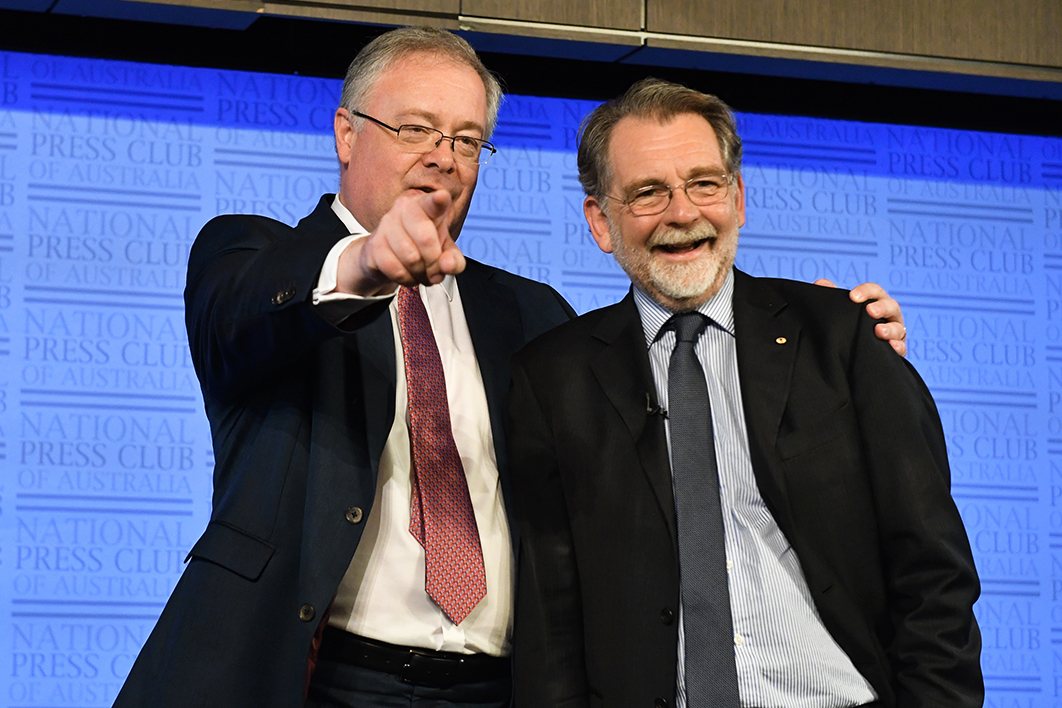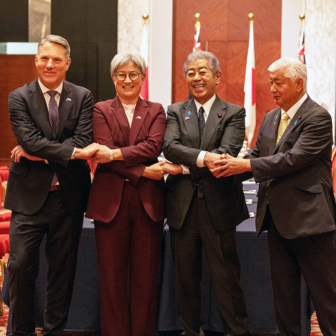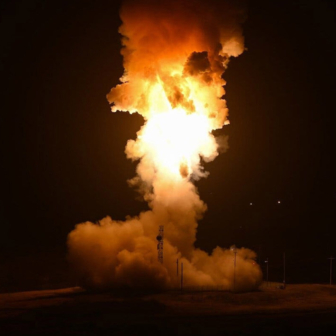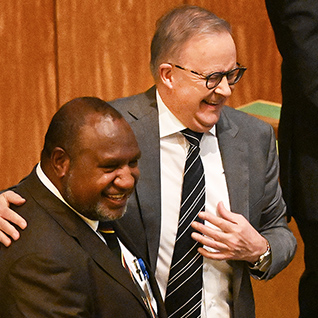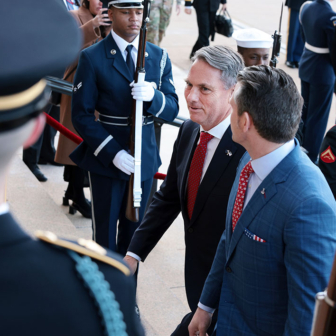Less than two years after John Howard’s government created the Canberra-based Australian Strategic Policy Institute to provide hard scrutiny of its defence and strategic policies, the prime minister was getting just that.
It was late 2002 or early 2003, not long before Howard publicly committed to joining George W. Bush and Tony Blair in waging war on Iraq. Papers by ASPI analysts, including inaugural director Hugh White, had disputed the case for war and opposed Australian involvement.
In a gathering that included government figures, White, a former deputy secretary for strategy in the defence department, found himself under attack for breaking ranks at a time of crisis. Howard, who was present, intervened. “No, no,” he said. “Hugh’s doing exactly his job.”
Two decades later, the notion of an ASPI head taking an adversarial stand against the government of the day and its defence–security establishment — or even allowing alternative voices in its analytical ranks — seems unthinkable.
The Australia Institute’s Allan Behm, another former senior defence official, is among those who think ASPI has strayed far from its original mandate. Howard’s aim, he says, was to create “a freestanding and independent commentator on mainstream national defence issues” that would hold defence officials like him accountable. It would make sure their advice “was subject to appropriate scrutiny by other people who knew as much as we did or indeed knew better than we did.”
White, who is now emeritus professor of strategic studies at ANU, believes a founding principle of the institute — that there should be no “ASPI view” — has also been eroded. Over time, the institute developed a single, hardline view on how Australia should respond to the biggest foreign policy and strategic challenge for a long time, the rise of China.
“Very little of what ASPI has published, except some material on its blog, has seriously contested what you might call the Canberra orthodoxy on those big questions,” White tells me. “And that’s a failure of ASPI to fulfil its true function.”
“Maybe that’s unfair,” he adds after a pause. “Where ASPI has criticised the prevailing orthodoxy and government policy it has criticised it solely on the grounds it hasn’t gone far enough.”
Talk to many of Australia’s most senior figures from the worlds of defence, intelligence and foreign relations, and similar criticism of ASPI comes thick and fast. Even among the toughest, though, the criticism is tempered with praise for Marcus Hellyer and other ASPI analysts who are still doing what used to be the institute’s core business — pulling apart the defence budget, scrutinising the uniformed and civilian defence machine, and assessing the costs and benefits of weapons systems.
Critics chiefly argue that ASPI has talked up the China panic and then proposed only one way to deal with it: more powerful weapons in larger quantities, closer military ties to the United States and an adversarial posture.
“ASPI started doing too many things, then it took on the ‘wolverine’ tendency” — a hawkish attitude to China — “to such a degree that I always knew what it would say about China so it wasn’t worth reading,” says one retired but still influential security figure. (Like some other critics keen to keep communications open, he asked not to be named.) “There was some genuine research which was valuable, but all of it was directed to proving a point. And once a think tank goes down that road and it’s a case for the prosecution, which it was, then it is no longer as influential as it might have been.”
With ASPI seen as echoing rather than questioning the Canberra orthodoxy, outsiders could assume it to be the voice of Australia, and a rather strident one. Those who actually set policy — the diplomats, defence personnel and intelligence analysts with perhaps more nuanced views — are muzzled by official secrecy requirements.
“ASPI has gone into a rather dark direction, where what it is really doing is amplifying a kind of new security ideology, a rather old-fashioned one,” Behm says. “Where it has ended up is in the creation of a network of reinforcing binaries, which in fact distort reality and are built around a premise that China is embarked upon world domination.”
That premise leads logically to very substantial build-ups in military capabilities, says Behm. “The consequence is to marginalise diplomacy and put the big emphasis on the ability to deliver kinetic force.” Worryingly, “it has been, and is being, successful,” he adds.
The former security figure echoes this concern. “There’s a really big story to be written about the military–industrial complex in Australia,” he says. “There are a lot of very powerful companies which have a vested interest in the defence area, and are therefore willing to put money into supporting the sorts of things that ASPI has done. Therefore ASPI has a vested interest in making its stakeholders and donors happy. There’s no equivalent in the foreign policy area.”
According to ASPI, nearly 40 per cent of its $11 million annual budget comes from the Department of Defence and another 25 per cent from various federal departments and agencies. Foreign government agencies in the United States, Britain, Canada, the Netherlands and Japan chipped in nearly $2 million, or 18 per cent, in 2020–21.
Defence contractors like BAE, Boeing, Lockheed Martin, Rafael and Thales contributed just $316,000, or 3 per cent of the ASPI budget — small change for them, and a bargain if ASPI does in fact influence spending on weapons deals such as the F-35s, submarines, frigates and armoured vehicles each worth tens of billions of dollars.
John Blaxland, professor of international security and intelligence studies at ANU, is one who disagrees that the sources of funding have called ASPI’s tune. At times, he says, its analysts have directly criticised what donors have been doing.
For an outfit of some thirty analysts and twenty support staff working mostly from open-source material, ASPI has an outsize voice. That’s largely the legacy of its longest-serving executive director, Peter Jennings, another former defence deputy secretary, who ended his ten years leading ASPI earlier this year. That decade roughly matched Xi Jinping’s first two terms as China’s supreme leader.
As Xi moved from the sweet-sounding goal of realising the “China Dream” through his Belt and Road Initiative to displays of military power, Jennings’s warnings became louder. ASPI and Jennings were quick to point to danger from China and ready to provide a quick quote to this effect for press gallery defence and foreign affairs correspondents. As one China specialist puts it, “He was kind of like driving around Canberra with a police siren on every day, yelling, ‘China! China!’”
Sometimes Jennings jumped the gun or ignored contrary evidence. He quickly blamed the crash of the Australian census computer system in 2016 on a Chinese cyberattack, but post-mortems found it was just an overload. When a proposed Chinese-built wharf in Luganville, Vanuatu, was played up as a base for the Chinese navy, the Vanuatu government’s insistence that its non-alignment forbade any foreign military bases was disregarded.
It was almost as if Jennings was leading a sort of backlash against the whole idea of diplomacy. The field of international relations has traditionally been a conservative one, respectful of government and diplomacy, as Rodney Tiffen, emeritus professor of government at the University of Sydney, points out. “Now there is a sort of counter-establishment, or new establishment, against the old Department of Foreign Affairs and Trade approach.”
Jennings declined to be interviewed for this article, saying any comments should be left to his successor. And, to be fair, he wasn’t the only contributor to rising public and government concern about Chinese power and influence. In 2016–17, prime minister Malcolm Turnbull had the Australian Security Intelligence Organisation and his own national security officials look for evidence of Chinese subversion and influence buying. Tighter laws on foreign lobbying and political funding resulted.
In an interview in 2019 after five years as ASIO director-general, Duncan Lewis warned about the risk of “insidious” espionage and interference. “You wake up one day and find decisions made in our country that are not in the interests of our country,” he said.
The academic Clive Hamilton also added to the fevered atmosphere in two books that painted Australia as already deeply penetrated by Chinese spies and political manipulators. News Corp newspapers provided an eager forum for this kind of “disclosure,” and some Fairfax and ABC investigative journalists named prominent business figures as instruments of the Chinese Communist Party, in one case resulting in a large defamation payout.
As well as deriding DFAT and specialist academics for clinging to hopes that Beijing would converge politically with the West, the hardline China critics attacked business leaders. Their sin was to try to stop trade being further damaged after the $20 billion worth of retaliation for Scott Morrison’s switch to “calling out” and “pushing back” against China in 2020.
That year the business-supported Sydney think tank China Matters lost funding from several federal departments and had its tax-deductible status removed. News Corp tabloids obliged by accusing it of lobbying against Australia’s interests. “Advocacy of ongoing engagement with the PRC does not make one a stooge of the Communist Party of China or an agent of influence,” protested its chair, former Macquarie Bank chief Kevin McCann. But the punishment remains, crippling this alternative voice.
While saying he sometimes disagrees strongly with what comes out of ASPI, the ANU’s Blaxland says its stance on China was probably consistent with a consensus among “insiders” briefed on the “aggressive and industrial scale of Chinese attempts at foreign interference.”
“Successive prime ministers, once they’ve been briefed on it, change their tune,” Blaxland says. “Julia Gillard, Kevin Rudd, Tony Abbott, Malcolm Turnbull, who was the most dovish, and not just Scott Morrison but now Anthony Albanese.”
The big question, says Blaxland, is how you respond to the challenge. “Do you beat the drumbeats of war or do you speak more softly and try and carry a bigger stick, which is what I would recommend. Let’s be careful about what we say.” The answer should not involve muffling or defunding ASPI, “which has done a public service by provoking a necessary and vigorous national debate. Let’s fund more bodies: AsiaLink, the Australia Institute, China Matters.”
Ahead of the recent federal election, Morrison’s defence minister, Peter Dutton, took steps to keep ASPI on the path set by Jennings. New appointments to the ASPI council included former Coalition ministers John Anderson and Michael Keenan, cybersecurity business figure Rachael Falk, and former army officer Catherine McGregor. Then, in this year’s budget, the Coalition granted ASPI $5 million in extra funding over two years to open a branch in Washington, a move that has baffled or infuriated many informed observers.
ASPI is about contributing to the Australian defence debate, not the American one, says Hugh White. “To the extent that ASPI’s role in Washington is simply to convince Americans that everyone on this side of the Pacific agrees with them, which they don’t, then they’re doing both us and the Americans a disservice.”
Adding to the puzzle is the fact that Washington’s Center for Strategic and International Studies had just set up its own Australia chair, under Charles Edel, a Yale-educated long-time think-tanker who has written extensively on foreign policy and security and has been a guest scholar at Sydney University’s United States Studies Centre. And that’s not to mention that Australia has one of its biggest embassies in Washington. Could not the $5 million have gone to research in places like Tokyo, Singapore, Jakarta and New Delhi?
Dutton also vetoed the new executive director proposed by a search panel of ASPI council members, former defence minister Brendan Nelson and former federal Labor MP Gai Brodtmann. Its preferred candidate was Michael Shoebridge, a former defence official who had long directed ASPI’s research covering defence, strategy and national security — its traditional focus.
Instead Dutton appointed Justin Bassi, chief of staff in the office of Marise Payne, Morrison’s foreign minister. Bassi had earlier been a national security adviser to prime minister Malcolm Turnbull and, further back, to attorney-general George Brandis. His career in the public service started in the Department of Prime Minister and Cabinet and the Office of National Assessments, or ONA (now the larger Office of National Intelligence).
Some think Bassi’s experience rather narrow for the role he has taken on. He has mainly focused on cybersecurity and domestic threats, hasn’t run any organisation larger than a ministerial office or a small ONA section, and hasn’t done anything much in the public domain.
His credentials as a security and China hawk are impeccable, however. On Turnbull’s staff he would have been deeply involved in the investigation of influence operations by the Chinese Communist Party’s United Front Work Department. And his job on Payne’s staff, one China-watcher says, was to “ride shotgun,” but until his or Payne’s memoirs are published we may not know for sure.
Payne did take on China during the Covid-19 outbreak with her call for an outside inquiry in April 2020. But three months later, during what is usually an annual bilateral ministerial love-in, she explicitly distanced Australia from harsh attacks on China by her US counterpart, Mike Pompeo.
Justin Bassi declined to speak to me about his plans for ASPI, and didn’t respond to emailed questions. “ASPI doesn’t tend to do interviews on itself, but rather interviews relating to its research on strategic and security issues,” its head of communications, Olivia Nelson, told me.
It is too early to judge how ASPI will fare under Labor, which is yet to reveal whether its bipartisan concurrence with nearly every defence and foreign policy step of the previous government was tactical — in an effort to avoid being wedged — or reflected genuine accord.
If there is pushback against the defence–security mindset, it will come from foreign minister Penny Wong, who has been active on the ground in the near regions of Southeast Asia and the Pacific islands. Signs of a reorientation of China policy include the appointment of former Beijing and Tokyo ambassador Jan Adams as secretary of DFAT, replacing the non-diplomat and part-time army general Kathryn Campbell, who was installed by Scott Morrison in August 2021. Joining Wong’s staff are DFAT officers with intelligence assessment experience, along with Natasha Kassam, a Mandarin speaker who has served in Australia’s Beijing embassy and was until recently a senior fellow at the Lowy Institute.
Wong’s office will have a receptive ear in the prime minister’s office. The new national security adviser, Philippa Brant, is a Mandarin speaker with a China-related doctorate who has worked with Wong; and Anthony Albanese’s new foreign policy adviser, Kathy Klugman, comes from DFAT.
Publicly, Wong is taking a quiet approach. But according to the Australian’s Ben Packham, she told DFAT staff a month ago, “I am asking you to help me bring DFAT back to the centre of the Australian government.” Later, in an interview with former ONA chief Allan Gyngell, national president of the Australian Institute of International Affairs, she indicated ambitions for a stronger DFAT voice in government. “The levers of state power have not been accorded equal value,” she said.
For the moment, many China hawks remain in place in Canberra. Andrew Shearer is still director-general of the Office of National Intelligence, and accompanied Albanese on his first foreign foray, a meeting of Quad leaders in Tokyo.
And so far, according to Packham, ASPI’s main paymaster is happy with it, and with Bassi. The first foreign trip by the new defence minister, Richard Marles, was to Washington, where he opened the new ASPI office, spoke at the Center for Strategic and International Studies, and attended the Australian American Leadership Dialogue, a closed-door gathering of official and private-sector ANZUS alliance worshippers. Marles astonished many defence analysts by going beyond the doctrine of “interoperability” to declare Australia’s forces should be “interchangeable” with those of the United States.
Back in Canberra, the new defence minister held a teleconference with twenty-five selected experts in defence and security fields, each given a few minutes to talk about what they saw as the most pressing issue. “No one who spoke at that meeting seriously contested the principles upon which the present government and their predecessors are approaching Australia’s strategic circumstances,” says Hugh White, who was one of the invited, though didn’t himself speak. Another participant said the general theme was the “urgency” of building up the defence forces, and improving equipment and munition procurement.
Nor has the appointment of two notably cautious figures — former Labor foreign minister Stephen Smith and former defence force and air force chief Angus Houston — to conduct a review of defence policy inspired hopes of a contest of ideas. From hints given at a recent defence conference in Perth, the pair will recommend more of the same, including more F-35 fighters.
Bassi, meanwhile, has many things to master in his new job. His installation has been deeply unsettling at the institute. Despite being elevated to deputy director, Shoebridge has resigned and circulated a barbed email to his colleagues.
Some see a bifurcation under way at the institute, with its International Cyber Policy Centre, directed by Fergus Hanson, employing more analysts than the traditional defence and national security wing, and eclipsing it somewhat in research output.
Overall, though, Bassi seems happy with the trend in Canberra. In one of his earliest writings as ASPI head, for the Australian Financial Review, he praised the new government for maintaining Coalition policy on Huawei and the 5G network, AUKUS and the Quad, for standing with other small and medium countries against Chinese “coercion,” and for not having “compromised” any foreign policy, national security or defence settings for the sake of dialogue with China. Nor, he wrote, should the bar be lowered for China to join the Trans-Pacific Partnership, a trade and investment pact. For ASPI’s new head, the Albanese government has got off to a splendid start. •
